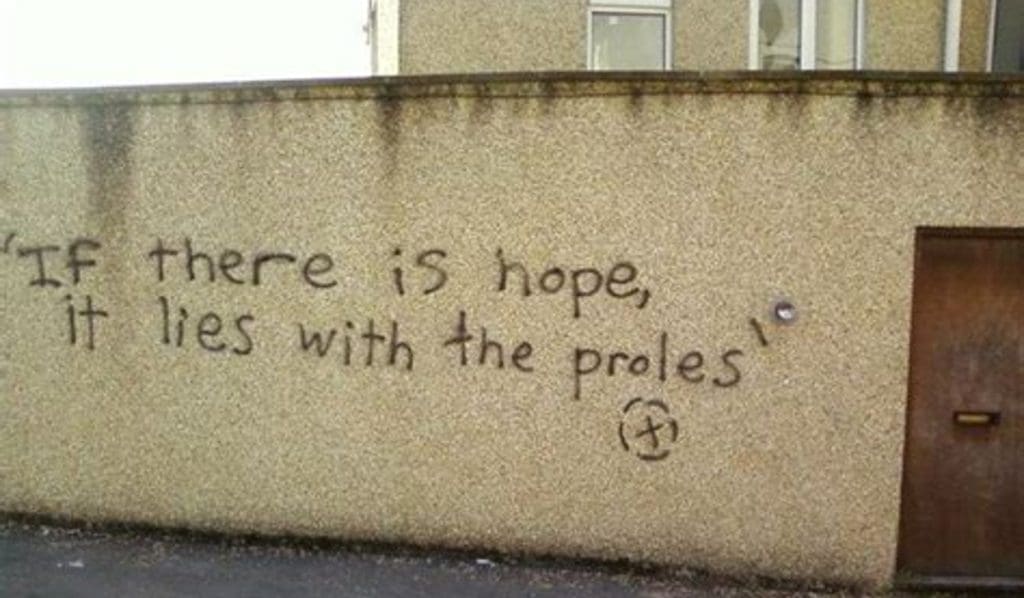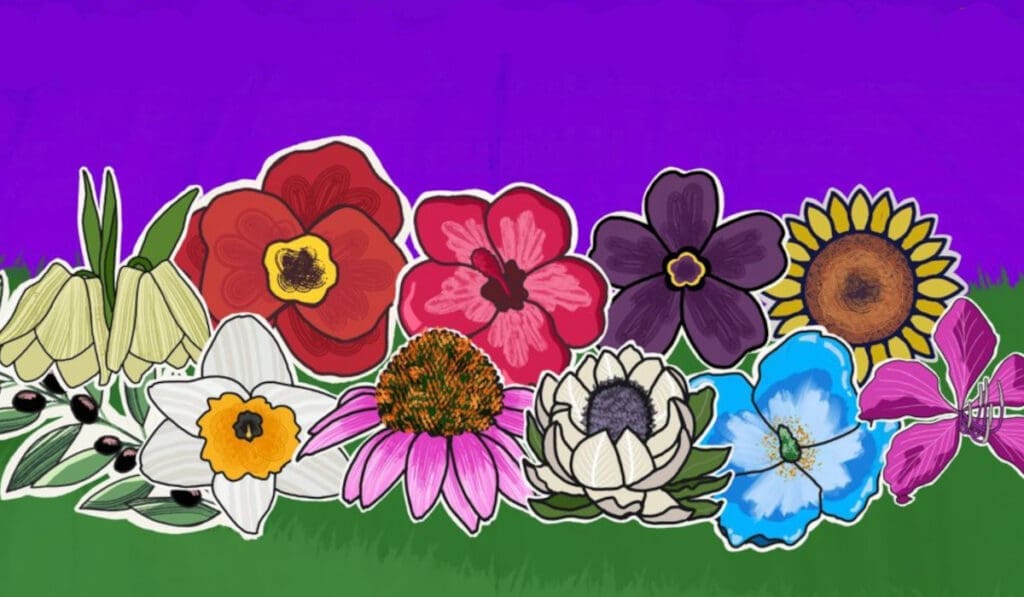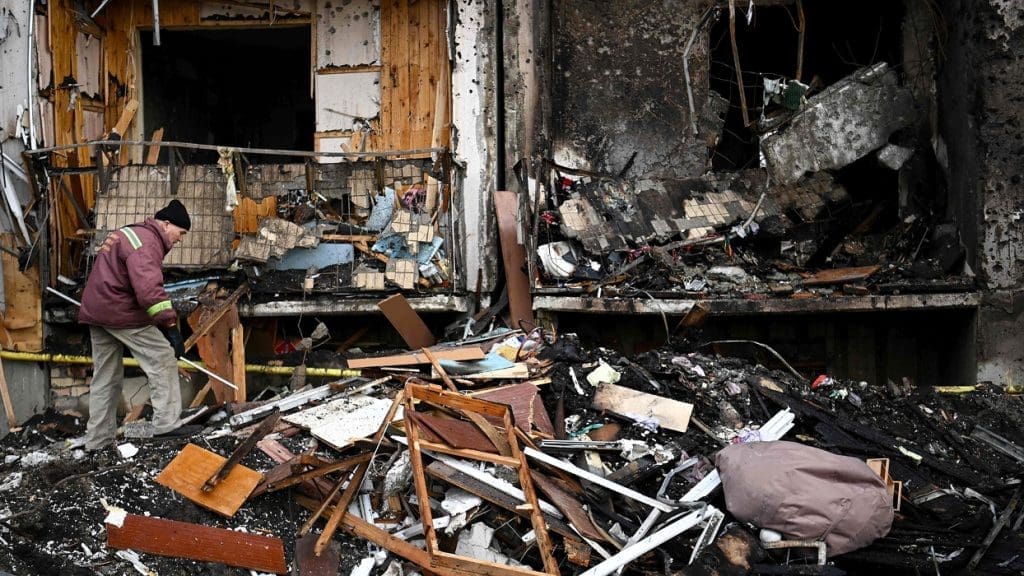Transcribed from the 17 February 2020 episode of This is Hell! Radio (Chicago) and printed with permission. Edited for space and readability. Listen to the whole interview:
Capitalism is a system of suffering, and it destroys people’s lives. It is a machine of extraction—extraction of value, extraction of mental and natural resources. But it is also a machine of exhaustion. It exhausts people. It burns people out. That is just the way it functions.
Chuck Mertz: Depression is far more than the textbooks and diagnostic manuals say it is. Depression is an intense feeling of unfeeling, where you live in a present where the future is already lost. Yet we can find hope and humor in depression, and within all of that, depression has its own politics.
Here to help guide us through what we do and don’t know about our current depressive state, from Copenhagen, scholar of depression in contemporary culture and literature Mikkel Krause Frantzen is author of Going Nowhere Slow: The Aesthetics and Politics of Depression.
Welcome to our show, Mikkel.
Mikkel Krause Frantzen: Thanks, Chuck, thanks for having me.
CM: It’s great to have you on the show. I just want to tell you, this is a fascinating book. I learned a lot from this book and I really just want to tell you before we start talking, I truly appreciate the work you’ve done here, so thank you very much.
You start by explaining how two questions form the basis of your work. “The first very simple question is the one that we innocently ask and answer every day: ‘How are you? How’s it going?’ The question of how we are doing is at times banal and brutal, as predictable as it is profound.”
What is the impact of depression when we, as a culture, as a society, are trained not to be able to answer a question like “How are you doing?” honestly, and we seem to be trained by custom and culture to lie, to answer this as just a throwaway question? What does it say about our culture when a question like “How are you doing?” is something that has no value, that is disposable?
MF: Well, it has a lot to say, honestly, and I think that innocent question says a lot about our fear of answering it truthfully. It says a lot in that people seem to be afraid of answering in a truthful manner. People are ashamed of saying, “Well, you know, I’ve had a shitty day. The weather in Copenhagen is awful. When I went to pick up my kids from school, one of them was behaving like a lunatic. I’m exhausted. It’s the first day after the winter holiday and…” Instead we are supposed to put on this happy face and just say, “I’m fine, thank you very much.”
Lurking behind that seemingly innocent question is the sole imperative or ideology, even, of happiness. At least that’s my argument.
CM: A lot of popular literature today says that we are in an epidemic of depression. If we are all supposedly in this epidemic of depression, have you seen any signs that we are becoming better at answering the question of how we are doing more honestly? If we’re all suffering from depression, have we found a common bond by saying and telling people exactly how we are doing?
MF: Not yet. This is one of the main paradoxes of our time, I would say. On the one hand, we are constantly told in Denmark that we are living in one of the happiest countries in the world. I guess it’s the same in Finland and Sweden and most of Scandinavia, even: that we are “very happy people,” and also we have scholars telling us that history is constant progress where people are getting wealthier and happier. This is the one side of the whole thing.
Then of course the other side, the darker side, is that rates of depression and other pathologies are skyrocketing. They are going through the roof. People are getting more and more depressed while at the same time supposedly being more and more happy. It doesn’t seem to make a whole lot of sense.
There is, of course, a deep connection between happiness and unhappiness, or between happiness and depression.
CM: According to the 2019 Happiness Report, Finland is the happiest country in the world, Denmark is now second, and the US has dropped from eighteenth to nineteenth happiest country in the world. I’m glad you brought this up because critics in the US often use the US ranking as evidence to counter those who argue the US is the greatest country in the world by saying that the lower ranking reveals the US clearly falls short of being the best, that the system in the United States is not the best, that other countries are better off than the US.
To you, what explains this seeming disconnect that’s taking place, from a country’s happiness to a nation’s power or ‘greatness?’ If the United States is the most dominant global power of the late twentieth century and early twenty-first century, why aren’t we the happiest people?
MF: If I knew the answer to that, I would be very rich, I guess. I can tell you that we just had this new commercial from Cocio, a brand that makes chocolate milk, and the tagline is “Make Denmark Happy Again.” That is one of the big aims apparently, to make Denmark the happiest country again, to make Denmark great again by making it happy. Of course it’s a silly commercial, but again, we have Coca-cola saying “Choose Happiness.” We have it in Carlsberg commercials, the Danish beer brand that welcomes visitors at Copenhagen airport to “the happiest country in the world” (I guess they haven’t looked at the most recent report from the World Happiness Foundation).
There are all these paradoxes characterizing our time. And of course it is no measure of how ‘great’ a country is that it is at the top of the happiness reports.
We have what I call a personalization of depression, which in my mind should be answered by a politicization of depression.
CM: Is our unwillingness to say how we are doing—is that unwillingness depression denialism, a defense mechanism? Are we all in a kind of denialism when it comes to depression?
MF: I would say no. There is no denialism in the sense that we are, at least in Denmark and in most of the Western world, talking about the mental health crisis. We are talking a lot about depression. We are talking a lot about suicides. Then again, we are talking about it within a very specific—and, I would add, problematic—framework.
We say yes, more people are depressed and that is a problem, but the way to solve that problem is through biochemical means, by big pharma and by individual therapy. Of course we have an immense attention to the psychopathology of depression. We have diagnostic manuals that are all too willing to offer general practitioners, and the whole field of psychiatry, the tools to diagnose more and more people with depression and other mental illnesses. But they do it in this way where they say context doesn’t matter. Causes don’t matter. All that matters is symptoms.
They look at symptoms only. It’s the same logic that characterizes the more public discourse on depression. I read this opinion piece in the New York Times a couple of weeks ago where a professor in psychiatry—I don’t remember his name—was talking about the epidemics of depression and suicide among teens, and he asked a lot of reasonable questions. But his solution was not less medicine or more collective solutions, it was basically more medicine, more individual solutions.
There’s not really a denialism going on as much as this very narrow-minded way of looking at the problem of depression. We have what I call a personalization of depression, which in my mind should be answered by a politicization of depression.
CM: Are we depressed because we will not focus on the causes and contexts of depression, only the symptoms? We have conversations on the show about not looking at the root causes of a problem—and because we are not looking at those root causes we are not seeing that capitalism is the root cause of many of those problems. It’s like we’re trying not to blame capitalism. We’re trying to obfuscate any view of capitalism as a cause for our problems. Are we depressed because we refuse to look at the root causes of our problems?
MF: That has something to do with it, certainly. I very much agree that capitalism is the main culprit here. Capitalism is a system of suffering, and it destroys people’s lives. And it is a machine of extraction, extraction of value, extraction of resources—mental and natural resources. But it is also a machine of exhaustion. It exhausts people. It burns people out. That is just the way it functions.
If we don’t start addressing that problem and that particular connection between capitalism—or capitalist realism as the late Mark Fisher called it—and the psychopathology of depression, then we won’t get very far in supposedly ‘treating’ the phenomenon.
CM: You ask, “What do we talk about when we talk about depression? How do we find it and capture its specificity? How do we deal with this phenomenon without treating it merely as a conglomerate of other previously known mental illnesses? Yet there is something more to depression, something specific that makes it discrete and distinguishable from other related phenomena. This is why the DSM [the Diagnostic and Statistical Manual of mental disorders, which lists a set of symptoms such as tiredness, insomnia, suicidal impulses, and so on] is not comprehensive let alone satisfactory—though perhaps understandable from a practical, clinical point of view.”
Can you be depressed without having the symptoms that are laid out in the DSM? Is there depression that is outside of that diagnosis? I know that this manual is incredibly important in the field, and so I’m sure that its influence trickles down to us in the layman public, so maybe their misunderstanding of depression leads to our misunderstanding of depression.
Can you be depressed outside of the symptoms of the DSM’s depression?
MF: I think you can. That said, some of the symptoms that they list are obviously real and truthful. When you are depressed, you are tired. You can’t sleep. That part of the diagnosis is true. But they don’t deal with the causes. They don’t deal with the context. That goes back at least to the third edition. I don’t mean to be too technical here, but the third edition of the diagnostic manual, the DSM, that came out in 1980 was the big landslide within the field of psychiatry, where we had a shift from trying to understand mental illnesses and mental disorders within the historical, societal context to only dealing with illnesses in terms of symptoms. That was a very important event.
At first it was an event within psychiatry, but then—as you just said—it trickled down, in a way, or it spread into the more public or popular way of thinking about and speaking about depression. But of course there are things that are not included within DSM—which is a bit striking, since the latest edition is around a thousand pages, and the number of illnesses has exploded from the third edition to the fourth edition to the fifth edition. You can find any kind of illness in there. The latest is grief, which is now also included in the pathological system; it is now pathological, in a way, to grieve too much or for too long.
But I deal a lot with the temporal aspects of depression: the way that you experience time. There’s been a lot of research done within phenomenology that has influenced my thinking quite a bit. But looking at depression from a more philosophical point of view is not included in the diagnostic manual. Then, of course, we have all the political issues that are certainly not included at all.
Talking to the younger generation, it strikes me that they are starting to realize they live in a shitty world. They live in a world which literally doesn’t have a future at all due to climate change, and they are experiencing (and also expressing) high levels of anxiety, grief, and depression.
CM: You write about this idea of the potential for pathologizing the normal. Are we finally, then, coming to our senses and realizing how depressing the world around us is? Or has the world changed to make us more depressed? Or are we misdiagnosing what is common as depression?
MF: That’s a tricky question, to be honest. There is certainly a case of overdiagnosing. Some psychiatrists would argue the reason that more and more people are depressed is not because of the society in which we live or the work/life balance that we may or may not enjoy very much, but rather because we have a better system for screening people and thus we are able to see that people are depressed—they were also before, but now we are able to see it professionally.
That is, of course, not something that I agree with at all. On the one hand, we do have overdiagnosis of what one might call ‘normal’ feelings such as sadness or grief, for instance. On the other hand it is clear to me that from the beginning of the 1970s onward, depression replaced anxiety as the dominant disorder among the mental illnesses. There is something very specific about our time and about our society that makes people suffer more and thus also become more and more depressed.
That has something to do with the economy: we are faced with economic crisis, high levels of private and public debt. People who are indebted are much more likely to suffer from distress, depression, and anxiety, because they worry about the future, they worry about making ends meet. That is well-documented within research. So there are different ways of answering your question.
CM: You write about time, as you were mentioning, and how people who are depressed perceive time. You write, “Time slows, and time stops, and people who are depressed experience time out of time, and a loss of a sense of the future.”
Is depression, then, more than just being bored of your routine that has become a rut? Is the loss of future more than just a loss of future due to apocalyptic climate change or something like that? When you talk about time and you talk about the future, is depression just an outcome of the routine of capitalism? And is the loss of future just the loss of the future due to climate change?
MF: It varies. Talking to the younger generation, in which I don’t include myself, it strikes me that they are starting to realize they live in a shitty world. They live in a world which literally doesn’t have a future at all due to climate change, and they are experiencing (and also expressing) high levels of anxiety, grief, and depression about the world they live in: the loss of nature, the lack of futurity. That certainly plays a big part in their life, I would say.
There are all these articles about young people killing themselves or trying to kill themselves because they can’t really see any future. They are just stuck in a present, and in a world, which doesn’t make sense to them. And not only that: it causes enormous amounts of pain just to live in that world.
So there’s that, and then of course there are people who are clinically depressed who have an apocalyptic mindset. That is also a common symptom of depression. If you have been around people who are depressed, they can be—to put it bluntly—annoying, because they are self-absorbed totally negative, and tend to see things in an apocalyptic light.
CM: You write about the possibilities of politics and how that can lead to depression. Are we depressed because, for instance, back in 2003, despite having the largest mass mobilization in world history, the invasion of Iraq could not be stopped? Are we depressed because we accepted the idea of Margaret Thatcher saying that there is no alternative? Is that why we’re depressed, because politics no longer seem to work?
MF: I think that’s a plausible way of putting it. Of course there are direct causal links here. It is not the case that Margaret Thatcher says this in 1982 and then, boom, forty years later people are getting more and more depressed. But of course, that world that she not only envisioned but also brought about, and which Ronald Reagan helped bring about in the US, that neoliberal world, that policy of austerity and that way of increasing inequality in society (which, by the way, doesn’t exist according to Thatcher)—that certainly didn’t help the mental well-being of the general population.
What it did instead was make people suffer more. It made people lose jobs, and also security in terms of their job situation. It is well known and well established that if you are in debt, and also if you have an insecure job situation, the risk of becoming depressed is much greater than if you were just living in another society. I would also say that what depression makes manifest is what I call the contemporary subject’s alienation, in its most extreme and pathological form.
I view depression as a symptom of a world where the future has no future, where there are no alternatives, as Thatcher put it. This is what Mark Fisher, the British cultural critic who also suffered from depression and whose writing on the topic has been incredibly important to me—this is what he called capitalist realism: the sense that not only is the capitalist and neoliberal system the only viable economic and political order, it also seems impossible to even imagine a coherent alternative to it.
That world without alternatives, that frozen world, or a world where the future is frozen—I think that drives depression, to be sure.
CM: You write, “One question that does not concern Mark Fisher is where this leaves the hypothesis of depressive realism, which states that depressed persons are not depressed because they have a distorted or delusional view of reality but because they have a more accurate perception of reality than people who are not depressed.”
I am depressed, and that’s the kind of depression I hear so often from our listeners. It’s what This is Hell! means—it’s a realization and recognition of the depressive realism around us. As we learn and as we gain in our understanding of what is happening around us, do we get more depressed? Is the ultimate transparency, knowing about the way the world operates today, just incredibly depressing?
Are we depressed simply because we’re becoming more aware of what’s happening in the world?
It’s very important to get away from this violent logic, which could be called a personal responsibility crusade, where the subject of the depressed person is made infinitely responsible for their own suffering.
MF: There are two ways of answering that question. The first, which I am skeptical of, is the romanticization of depression that can be found sometimes in writings on and about depression, where there is a rosy version of the depressed artist or the depressed genius or the depressed visionary who is able to see the world ‘as it really is.’ I think there’s absolutely nothing romantic about being depressed. It is hell on Earth if you are clinically depressed, and it’s really nothing to be applauded. There’s no romanticism involved. That’s the first thing.
The second thing is that thinking about the relation between capitalism or the political economy and the psychopathologies of the present is not a matter of epistemology. That’s a bit philosophical. What I mean by that is: I don’t think you get depressed because you suddenly see the world as it is, or you see the world in all its horrors. I think you get depressed because you are indebted or because you have a shitty job, or because you’re working three jobs, or because you can see the world’s planetary situation is totally bad.
But that’s not just a matter of perception or epistemology. That’s also a matter of materialism and money and financial issues and your bank account and your working hours and your life and your family and all of that—and your race and your gender. I do not see this as a matter of “seeing the world as it really is” and then getting depressed.
CM: You write, “There is the paradoxical existence of depressive art as such, the paradoxical comedy of depressive art, and the paradoxical hope sometimes made manifest in depressive art.”
Why is depressive art funny and hopeful? Why isn’t it simply sad and hopeless? Why would you want to make depressive art that was funny and hopeful?
MF: One of the things I found when looking into the contemporary culture and literature that deals with depression is that a lot of the works I read or saw or experienced were funny. They had a dark humor, and as Samuel Beckett once wrote, nothing is funnier than unhappiness. That’s why Kafka is funny, that’s why Thomas Bernhardt is funny, that’s why Samuel Beckett himself is so funny—because it’s so dark. It’s also to be found in the works of David Foster Wallace and Michele Houllebecq. After writing the book I’ve become less and less thrilled about Wallace and Houllebecq. But they have their moments where they are generally funny, because they are generally depressed and dark authors.
CM: You write, “When you look at any of these works, the problem is not one of anomie, or of the pulverization of social bonds. This is at most an epiphenomenal problem. Rather, these works tell us that the core of the problem of alienation is proximity rather than distance: the total integration of work and life rather than a brutal separation between the two. A warm, affective economy rather than a cold and abstract one.”
So is the problem not one of loneliness, as the British government has concluded (appointing a “minister of loneliness”) but of not being alone enough?
MF: I found this insight in the book The Noonday Demon, which is a documentary work by Andrew Solomon, a book on his own depression. There he writes that we are not depressed because we are too far away from the things that we want, but because we are too close to them. When I’ve studied depression, it popped up again and again, this theme of being too close to the things that we really want, or to be too immersed in one’s work or job for instance, and it’s so hard to separate the two.
Of course that doesn’t mean that we are not lonely. It’s just an interesting way, maybe a speculative way, of thinking about the current problem. Of course, the go-to logic would be we are totally alienated from each other. We are sitting with our own screens, in front of our iPhones and computers and whatnot, being on social media, and we are not able to connect anymore. But again I would be a bit hesitant to give that much credit or explanatory power to technology and social media—the logic being that it’s all social media’s fault.
CM: Do we choose to be depressed by allowing that proximity and immersion into the market, allowing it into our homes and our pockets at all times? Or is it something that’s outside of our power to allow or disallow, and it’s just been imposed on us by the market?
MF: It’s not either/or, I would say. The general vibe that you pick up from self-help coaches or lifestyle gurus or psychologists is that it is basically only a matter of choices. If you are happy, it is a matter of your choices alone—and that also means, of course, that if you are unhappy it’s also a matter of your own personal choices. It is a matter of your lifestyle. It is a matter of your mindset. And of course the same logic applies to obesity, to poverty—the logic being that if people are poor, it is their own fault. They could have made other choices. If people are not thin enough, it’s their own fault. They could have made other choices and eaten healthy food, and so on.
The same logic is definitely, totally ingrained in the popular way of looking at depression, where it’s a matter of your own choices. I think it’s very important to get away from that kind of violent logic, which could also be called a personal responsibility crusade, where the subject of the depressed person is made infinitely responsible for their own suffering. I would say no. We should rather try to collectivize and politicize our suffering. We need to realize that this suffering is not our fault alone. We are not alone in our suffering.
If three hundred million people worldwide suffer from depression, it is a common political, societal, and historical problem. That doesn’t mean, on the other hand, that the choices you or I make don’t play a role at all. Of course they do. Of course we have some responsibility. But the tendency is to place all responsibility on the subject, on the individual, and I think we need to get away from that as soon as possible.
CM: You write, “The new or contemporary feature of the ‘no-future’ Stimmung [mood] that writers such as Fredric Jameson addressed quite a long time ago (emphatically encapsulated by Jameson’s famous quip that it is easier to imagine the end of the world than an alternative to capitalism) is that today this is no longer the shocking realization of a cultural vanguard, such as the punk movement, who was saying it in the past.”
The punks saw no future because they could not see a future without capitalism. Are we all depressed by the idea that this is as good as it gets? That it does not and will not get any better? Are we all now punks? Has the punk philosophy of no future been normalized and accepted by everyone?
MF: To a certain extent the answer is yes. What was a shocking realization to them is just common knowledge, especially to the younger generation. They know all too well that they have no future at all.
CM: I asked this question online, and somebody replied that it is very easy to imagine an alternative to capitalism, that it’s not a problem whatsoever and shouldn’t be a problem for anybody. Is it easy to imagine an alternative to capitalism?
MF: I know what the listener was getting at. Reading a lot of science fiction lately, it seems fairly easy to imagine different worlds, different arrangements, alternative economic and political systems. But then again, do we really believe that it’s realistic? I’m not so sure. On a more personal, anecdotal note, I was at a climate demonstration a year or so ago with my two twin daughters, along with a lot of friends and a lot of people in Copenhagen. We were there protesting climate change and all that. But while we were standing there, I had the feeling that no one in the whole crowd really believed that what they were doing had any impact.
I think maybe that’s also a generational question, or issue, or difference even. Some of the younger generation go on school strikes, they protest. It seems that they actually believe that they can make a different world. And of course it is there that our hope lies.
CM: Thank you so much for being on our show, Mikkel.
MF: Thanks for having me, Chuck.
Featured image source: somewhere in Wales, apparently? It’s all so sad it’s funny.





